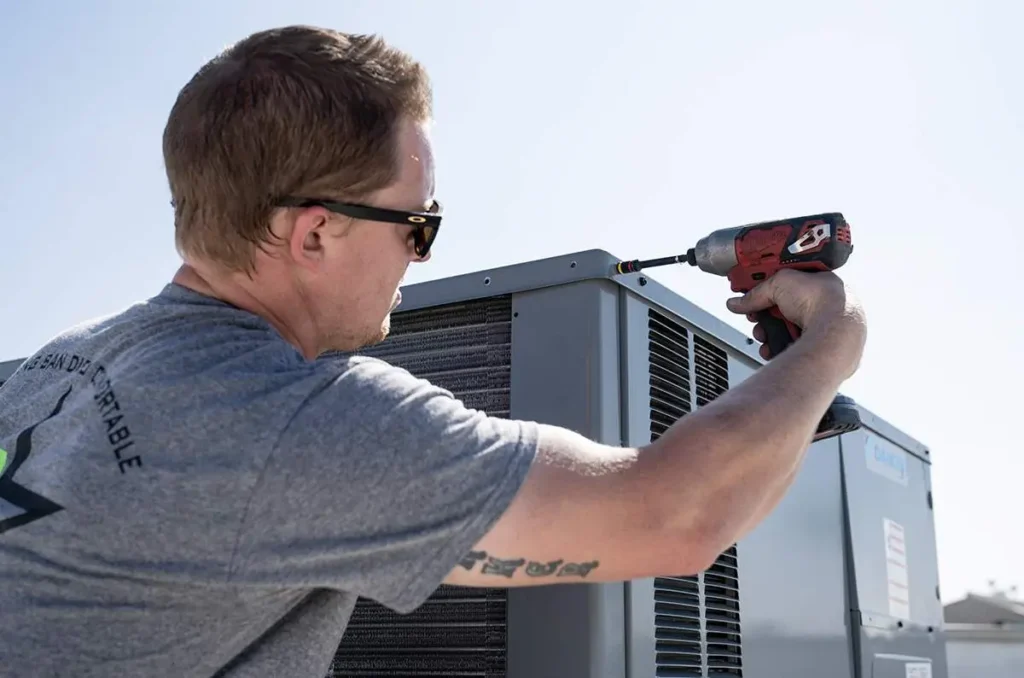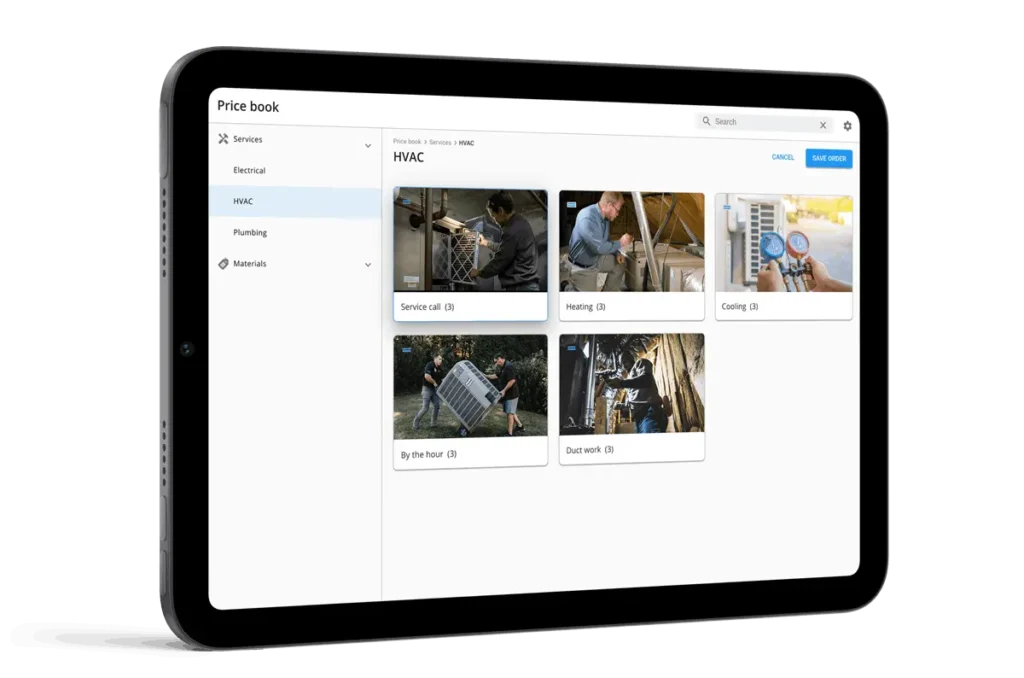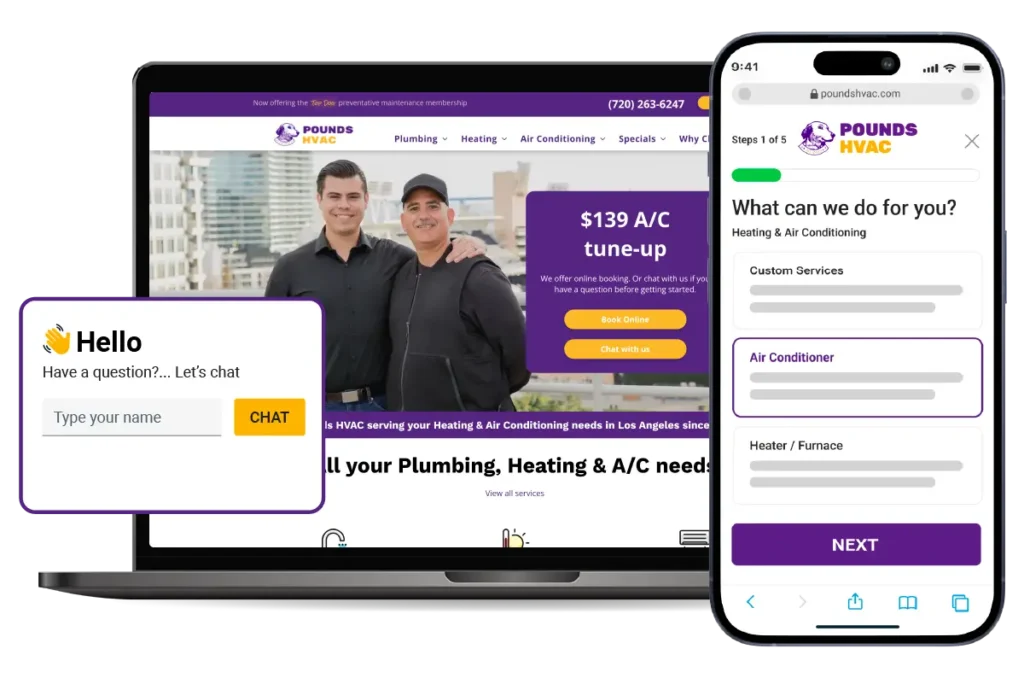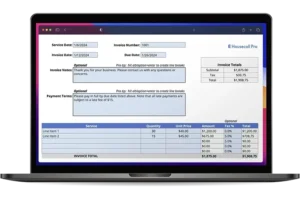
Want to see your potential revenue?
See what businesses like yours earn with Housecall Pro in 1 - 2 minutes.

For many HVAC technicians, the next step after years in the field is business ownership. Running your own HVAC company can give you more control, a flexible schedule, and higher earnings, but starting off on the right foot takes careful planning, the right credentials, and strategic thinking.
This guide explains how to start an HVAC business step-by-step, from licensing and tools to tips for marketing and pricing your services. You’ll also learn how HVAC software can save you time and stress as you scale.
Key takeaways:
Here’s what to keep in mind before you launch your HVAC business.
Create a solid business plan: Define your services, research competitors, and set realistic revenue and growth goals.
Plan your finances wisely: Estimate startup costs, separate business and personal finances, and invest in essential insurance and tools.
Market your business: Build a professional brand, claim your Google Business Profile, and promote your services both online and locally.
Grow strategically: Use HVAC software to streamline operations, hire skilled techs, and expand your offerings as demand increases.
HVAC business startup checklist
We’ll break down each of these steps in more detail below, but here’s a high-level checklist to keep in mind as you move through the process.
- Step 1: Get your HVAC license and certification
- Step 2: Create an HVAC business plan
- Step 3: Secure funding to start your HVAC company
- Step 4: Register and license your HVAC business
- Step 5: Get HVAC business insurance and bonding
- Step 6: Buy HVAC tools and equipment
- Step 7: Price your HVAC services
- Step 8: Create an HVAC Marketing Plan
- Step 9: Grow your HVAC business
- Step 10: Use HVAC software
Step 1: Get your HVAC license and certification
If you’re just starting out in the industry, you’ll need the right training, credentials, and experience before you can think about opening your own company. Not only do most states legally require this, but customers also want proof they’re hiring someone qualified to work on their expensive systems.
“Don’t rush into owning a business just because you can. Get a solid apprenticeship and master the trade first,” says Danny Reddick, owner of the HVAC, electrical, and plumbing business Reddick & Sons.
HVAC training
The first step in becoming an HVAC technician is to complete training. Your three main options are:
- Trade school programs (6–12 months, $1,500–$5,000): These programs often focus on hands-on skills like wiring, brazing, and system diagnostics. They’re faster and less expensive than an associate degree, but less comprehensive than a full apprenticeship.
- Associate degree programs (2 years, $15,000–$35,000): These programs are ideal if you aspire to own your own business. They offer deeper technical training and courses in math, business, and customer service.
- Apprenticeships (3–5 years, $500–$2,000 in fees): This is the quickest way to enter the workforce, allowing you to earn while you learn. Apprenticeships combine hands-on work under a licensed contractor with classroom study. Many HVAC pros say this route best prepared them for real-world troubleshooting.
State licensing and EPA certification
You’ll need to meet specific state requirements to get your HVAC license. Most states require HVAC contractors to pass an exam, prove your work experience, and provide insurance documentation. These requirements vary, so be sure to check your state’s contractor licensing board for exact details.
EPA Section 608 certification is also federally required to handle refrigerants. Without it, you can’t legally buy refrigerant or service most AC systems. Types include Type I (small appliances), Type II (high-pressure systems), Type III (low-pressure systems), and Universal (Types I–III). Most techs get Universal certification since it covers all HVAC work and gives them the most flexibility.
Step 2: Create an HVAC business plan

A business plan sets out your services, pricing model, goals, and target market. Banks and investors often require one if you’re trying to secure financing.
Research your market and competitors
Start by reviewing your competitors on Google Maps, Yelp, or Angi. Consider their:
- Service area: Are they local only, or do they serve an entire metro region?
- Services offered: Do they focus on installs, repairs, or maintenance?
- Pricing structure: Can you find sample rates on their websites?
- Customer reviews: What do customers complain about the most?
“Don’t just look at the big companies—check what other small, independent contractors are charging,” Reddick says. Those local competitors are the real measure of where you can fit in and what customers expect. For example, if reviews show that it took two weeks to get an appointment, that’s your chance to compete on faster response times.
Create an HVAC services list
Most HVAC companies offer the same core services, but you don’t necessarily have to offer them all right away. Start with a short service list—installs, repairs, tune-ups, and maintenance contracts—then expand once you have steady cash flow.
“Don’t try to be everything to everyone at the beginning,” says Sergey Nikolin, president and co-founder of Product Air Heating and Cooling LLC. “Start with a narrow set of services that you can deliver really well. Only expand into extras if you have the staff and systems to support it.”
In the early days, that might mean focusing on residential installs and preventive maintenance. Later, you might branch out to offer things like duct cleaning or 24/7 emergency service.
Pro tip: Installation jobs bring in high-ticket revenue, but maintenance contracts mean predictable, recurring income. Get the best of both worlds by offering both.
Set goals
Setting clear goals can help keep you accountable and motivated. Example goals might be:
- Year 1 (short-term): Hit $150,000 in revenue, complete 8–10 jobs per week, and sign at least 50 customers to maintenance plans.
- Year 3 (long-term): Expand into light commercial HVAC, run two fully equipped trucks, and hit $500,000+ in annual revenue.
Use these goals as a roadmap, and revisit them regularly to measure progress and adapt as your HVAC business grows.
Write your plan
Once you’ve done the research, it’s time to put together your HVAC business plan. Here are the key elements to include:
- Executive summary: A brief overview of your business goals and what you aim to achieve.
- Business overview: A description of your company, mission, vision, and the services you offer. (Helpful hint: Write this section after you’ve completed the other components).
- Market analysis: Breakdown of your target market, competitors, and potential customer base.
- Services offered: A clear outline of the HVAC services you plan to provide.
- Sales strategy: Details on how you plan to approach and secure customers.
- Funding requirements: A breakdown of startup costs and funding needs, if applicable.
- Financial plan: Financial projections for revenue, expenses, and profitability over the next few years.
- Marketing plan: Strategies for promoting your business and reaching potential customers.
- Appendix: Additional supporting documents, like certifications or legal paperwork.
Learn more: Download our HVAC business plan template
Step 3: Secure funding to start your HVAC company
Starting an HVAC company is expensive. If you can’t use personal savings, you have a few other options:
- SBA Loans: Small Business Administration loans offer competitive rates and flexible business financing with manageable repayment terms. These loans are popular for startups needing initial funding.
- Grants for small businesses: Look into government or private grants tailored for small business owners, especially those in trades or eco-friendly industries.
- Business line of credit: A business line of credit gives you flexible access to funds as needed, making it easier to cover unexpected expenses or manage cash flow during slow periods.
Pro tip: Sign up for a business bank account to keep your personal funds separate from your business. Partnering with a bookkeeper or financial advisor can help you set this up correctly.
How much does it cost to start an HVAC company?
Startup costs vary depending on location, equipment choices, and how quickly you want to scale.
Equipment and supplies: $5,000–$15,000 for tools, gauges, and a service vehicle (more if you buy new and branded)
Licensing and permits: $500–$2,000, depending on your state and county requirements
Insurance coverage: $2,000–$6,000 annually for liability, workers’ comp, and auto policies
Marketing and branding: $1,000–$5,000 for a website, logo, business cards, and vehicle wrap
A solo operator with one van and basic tools may spend on the lower end, while a company launching with multiple trucks and technicians will face higher costs. The key is balancing savings with smart investments. Refurbished tools or leased vehicles can lower your investment upfront, but don’t cut corners on essentials like insurance and reliable equipment.
Also consider costs for items like uniforms, fuel, office supplies, and any essential tools you still need. “If you don’t account for all of it, you’ll be leaking money without realizing it,” says Irena Martincevic, an analyst at the home services platform Fixr.com.
Step 4: Register and license your HVAC business
You’ll need to legally set up your business before getting off the ground. Here’s a step-by-step guide:
- Choose a business name: Pick a name that represents your services and is easy for customers to remember. Make it unique to stand out in the industry.
- Do a trademark search: To avoid potential legal conflicts, check for existing trademarks. Tools like TMchecks offer free searches and can even help brainstorm creative name ideas.
- Verify domain name availability: Use platforms like Namecheap or GoDaddy to confirm the availability of a matching domain name for your website.
- Get a Federal EIN: Apply for an Employer Identification Number (EIN) through the IRS. This number is used for tax purposes and to open a business bank account.
- Register with state and local authorities: Depending on your state, this may involve filing articles of organization or incorporation and paying a registration fee.
Along with a business registration, you’ll need licensing. For the most part, you need two types of business licenses to legally operate your HVAC company: a general business license, allowing you to operate legally, and an HVAC contractor’s license specifically for performing HVAC work.
Application requirements and fees vary by state, but you’ll typically need to prepare proof of your liability insurance, your business registration paperwork, and your state-issued contractor license number, plus pay an application fee.
Pro tip: Store your licenses and insurance digitally in Housecall Pro so you can pull them up quickly if a customer or inspector asks. Make sure to set reminders about expiration dates or continuing education so you don’t risk delays in your day-to-day business.
Best business structure for HVAC
Check with a legal advisor and your accountant to determine the best business structure. You have a few options:
Sole proprietorship
- Liability: The simplest structure, but you’re personally liable for all debts and legal claims against the business.
- Taxes: Income is reported on your personal tax return.
- Management: You have full control, but there’s no legal separation between you and the business.
Limited Liability Company (LLC)
- Liability: Provides a layer of protection by separating personal and business assets.
- Taxes: Income passes through to your personal tax return, avoiding double taxation.
- Management: Flexible; you can operate as a sole owner or bring in partners.
Corporation (C-Corp or S-Corp)
- Liability: Protects personal assets, similar to an LLC.
- Taxes: A C-Corp is taxed at corporate and personal levels, while an S-Corp avoids double taxation.
- Management: Requires formal structure with shareholders, a board of directors, and detailed record-keeping.
Recommendation: If you’re starting as a sole owner, an LLC can provide flexibility and protection without the complexity of a corporation.
Step 5: Get HVAC business insurance and bonding
Insurance is your business’s safety net. One accident on a jobsite, like a refrigerant leak that damages a client’s property, could wipe out months of revenue if you’re not covered.
Here are the main policies you’ll need and approximate costs:
- General liability insurance ($500–$1,500 per year): Covers property damage or customer injuries. For example, if a tech accidentally drills into a water line during an install.
- Workers’ compensation (varies by payroll size): Required in most states once you hire employees; covers medical costs if an employee gets hurt on the job.
- Commercial auto insurance ($1,200–$2,000 per vehicle): Covers accidents involving company vehicles, plus whatever tools you store inside.
- Bonding ($100–$500 per year): Guarantees job completion; often required for government contracts or larger commercial clients.
When you’re getting insurance, don’t settle for the first policy you’re offered. Instead, compare policies and revisit coverage regularly as you expand.
Step 6: Buy HVAC tools and equipment

Start with must-haves from reputable HVAC suppliers, then upgrade and expand your tool and equipment list as you grow.
Reddick puts it simply: “Your tools are your livelihood. The essential tools to invest in first are a reliable van, a complete set of hand tools, a good manifold gauge set, a vacuum pump, a leak detector, and a recovery machine. Don’t buy the most expensive tools out of the gate unless you’re sure you’ll use them constantly.”
Start with some essential HVAC tools like:
- Screwdrivers, pliers, and wrenches
- Pipe cutters and benders
- Multimeters and thermometers
- Manifold gauges
- Gloves, goggles, and respirators
- Hard hats, steel-toed boots, and ear protection
Invest in these nice-to-haves as your budget allows:
- Refrigerant recovery machines
- Leak detectors
- Nitrogen regulators
- Thermal imaging cameras
- Refrigerant scales
Of course, you’ll also need a vehicle to transport your tools and parts. If you have the budget, a branded wrap or decals can act as a rolling billboard to attract clients.
Pro tip: Use Housecall Pro to keep track of all your tools, schedule maintenance, and assign equipment to techs so nothing goes missing from the jobsite.
Step 7: Price your HVAC services

Pricing should cover labor, materials, overhead, and profit. First, choose your model. Popular choices among HVAC pros include:
- Hourly rates: Great for troubleshooting, but unpredictable for clients.
- Flat rates: Clear and consistent. Great for installations and maintenance jobs.
- Hybrid: Hourly for diagnostics, flat for repairs.
Nikolin recommends starting with a flat-rate pricing model. “Customers hate surprise hourly charges. It’s better to create flat rate pricing for common repairs like a capacitor swap or refrigerant leak check. This gives them peace of mind and makes them more likely to choose you.” Plus, it protects you from losing money if a job takes longer than expected.
Once you pick your pricing model, figure out your rates. Use our service price calculator to get started quickly. Here’s what the process entails:
- Calculate your costs including materials, overhead, and labor (use a labor cost calculator to make this easier).
- Add a profit margin that matches your business goals.
- Check local competitors for a ballpark reference point. What are they charging for installs, tune-ups, or emergency calls?
- Tweak your pricing (and potentially pricing model) based on your service type. For example, emergency repairs usually cost more than scheduled maintenance.
Example: Say your labor rate is $50 an hour, and the job takes two hours. Materials come out to $200, and overhead (fuel, insurance, admin time) is $100. That makes your total cost $400. With a 20% profit margin, you’d charge $480.
Martincevic stresses that your pricing should be built for profitability, not just survival. “A healthy HVAC business usually sees a 15%–25% net margin. Price your services so you actually hit that.”
Learn more: HVAC pricing guide: How to maximize profits and win more jobs
Step 8: Create an HVAC Marketing Plan

Customers can’t hire you if they don’t know you exist. Even the best technicians need strong HVAC marketing to build awareness, trust, and repeat business.
Build your brand
Invest time and money into your branding—choose a name and visuals that clearly communicate who you are and what you do. Create a logo and use its colors on uniforms, vehicles, and invoices so your business looks professional and recognizable. This helps customers remember you and can significantly boost your ROI as your business grows.
Build an online presence
Most customers start with an online search when they need HVAC help. Make sure they can find you:
- Launch a website with service details, pricing, and contact information.
- Claim your Google Business Profile to show up in local searches.
- Share testimonials, before-and-after photos, and seasonal promotions on social platforms like Facebook and Instagram.
Reviews are one of the strongest drivers of new business. Once you’ve got the ball rolling, ask satisfied customers to leave feedback on Google or Yelp. As Reddick puts it: “Nothing beats word-of-mouth. Get out there and talk to people.”
Use offline marketing strategies
Digital HVAC marketing is important, but traditional marketing strategies help you stay visible in the community and build trust with customers who prefer face-to-face interactions. Here are a few ideas:
- Distribute flyers or door hangers in target neighborhoods
- Sponsor community events to get your name out in a positive context
- Offer referral rewards like discounts or gift cards
- Partner with property managers and real estate agents for steady leads
Pro tip: Use Housecall Pro’s Campaigns feature to automate online marketing tasks, like sending follow up emails and postcards, so you have more time to focus on growth.
Focus on customer experience
Marketing doesn’t stop once you’ve booked the job. Responsiveness and follow-through are key to retention.
“Tell everyone exactly what you offer, answer every call, return every message, and if you can’t take the job, give a clear timeline,” Nikolin says. “If a potential client can’t reach you the first time, they will most likely never call you again.”
His trick? “For first-job clients, always stick a QR code directly on the AC unit or furnace. Next time something happens, your client can scan it and reach you right away.”
Step 9: Grow your HVAC business

Once your schedule is consistently full and you’re turning down work, it’s time to think about growing your HVAC business. This might include:
- Expanding your service area: Identify nearby neighborhoods or cities with high demand and target them with marketing.
- Investing in additional vehicles or equipment: As your profits grow, reinvest in your business. Make sure your team has the tools and trucks needed to complete jobs efficiently.
- Introducing new services: Launch maintenance plans or additional HVAC offerings to increase recurring revenue.
Hire HVAC technicians
Hiring skilled HVAC techs can help you take on more work without sacrificing quality. Here are some signs it’s time to add staff:
- You’re booked more than two weeks in advance
- You’re turning down jobs regularly
- You’re working 60+ hours per week
Vet each of your candidates carefully. Technicians represent your brand, so check references, verify certifications, and use a structured interview process to streamline things. Consider also bringing on an office manager or dispatcher to help with scheduling, customer calls, and paperwork.
Additional resources to help you hire the best HVAC team
- HVAC technician salary guide: Discover average HVAC technician salaries across the U.S., including insights into regional pay differences.
- Hiring and leadership guide: Learn the ins and outs of building a high-performing team with this comprehensive guide to hiring and leadership for HVAC business owners.
- HVAC employment application template: Save time and stay organized with this customizable application template to screen and evaluate job candidates.
- HVAC office manager job description template: Attract the right talent with this professionally crafted job description template for hiring an office manager.
Step 10: Use HVAC software
Running an HVAC business means juggling schedules, jobs, and customer communication. The right software can simplify these tasks, save time, and set the stage for growth. Housecall Pro brings everything together in one platform, including:
- Scheduling and client management: Book appointments, assign jobs to techs, and send automated reminders.
- Pricing and invoicing tools: Quickly create estimates and invoices to maintain consistent, accurate pricing and get paid faster.
- Marketing and client acquisition: Automate follow-ups, request and track reviews, and manage referrals.
- Sales proposals: Build professional, detailed quotes in minutes with sales proposal software.
- Recurring service plans: Create and manage maintenance agreements with recurring service plans for steady cash flow.
- Time tracking: Log and review hours with time tracking software to keep payroll accurate.
- Operational efficiency: Process payments, complete digital forms, and access everything from a convenient mobile app.
- Growth support: Manage employees, contractors, and multiple locations as you expand.
Ready to launch your HVAC business with confidence? Try our free 14-day trial and set up the systems you need to stay organized, win jobs, and grow from day one.
How to start an HVAC business FAQ
-
How profitable is an HVAC business?
-
An HVAC business can be very profitable, with net margins often ranging from 10% to 20% for well-managed companies. Profitability depends on factors like service mix, pricing, overhead control, and efficient scheduling.
-
What percent of HVAC businesses fail?
-
Roughly 20% of small businesses close within two years, according to the Small Business Administration. HVAC businesses tend to be more resilient because of the constant demand, but planning, cash flow management, and smart marketing are essential—especially in highly competitive areas.
-
What licenses are needed to start an HVAC business?
-
To start an HVAC business, you typically need a state contractor’s license, any required specialty HVAC certifications, and local business licenses or permits. Requirements vary by state, so check your local licensing board before starting.
-
Can you start an HVAC business with no experience?
-
Yes, but you’ll need to hire or partner with a licensed technician until you meet the requirements yourself. Many successful business owners come from business or sales backgrounds and partner with experienced HVAC techs to handle the fieldwork.
-
Is HVAC a good business to start?
-
Yes. HVAC demand is steady year-round, with energy efficiency upgrades and smart home tech expanding opportunities.
-
How do HVAC business owners get customers?
-
Start with referrals from family, friends, or past clients. Claim your Google Business Profile, build a simple website, encourage reviews, and network with property managers and real estate agents. Consistency, both in service quality and marketing, is what brings repeat customers.








